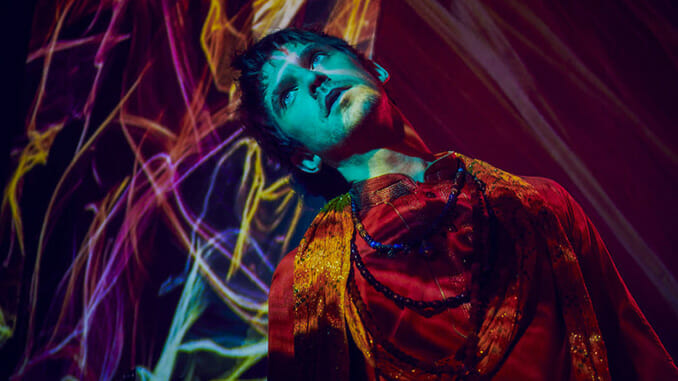Battling a Complacent Marvel Machine, Legion Championed Brave, Bold Superhero TV
Photos Courtesy of FX
Superhero fatigue is upon us. After over a decade of big budget successes, it feels like every new show and movie has some comic book roots. And now it’s not just the mainstream heroes getting new incarnations, shows like Invincible and The Boys have introduced a new field of superhero media that comments on its own existence. The big players are getting in on it too, with Disney+’s upcoming Moon Knight already claiming to be darker than any previous Marvel work. Every superhero property claims to be a different take, something special to set it apart. But only one had the guts to solve their problems with a rap battle.
Legion is a weird show. The Noah Hawley FX series originally marketed itself as an X-men adaptation of the Marvel character Legion, Professor X’s son plagued by multiple personalities with different superpowers. But the show’s comic book ties were only a prompt for its existence, not its entire purpose. Legion is actually one of the most ambitious series ever made, a science fiction show about reality, time, and the nature of humanity itself that needs to be seen to be believed.
If Legion could be compared to anything, Twin Peaks might be its closest companion. But even that is a tenuous connection. Legion is an abstract horror show, a psychedelic journey, a celebration of the hippie and midcentury-imagined futures of the 1960s. Legion treats storytelling like a ball of yarn and knits its own identity.
The series only lasted three seasons and suffered from diminishing interest after its first. It’s not surprising, audiences probably expected a fun superhero show and instead they got…Legion. It’s hard to sit down for an X-men show and get recurring monologues by Jon Hamm explaining existential thought experiments during a series that disregards linear narratives. But Legion never cared about keeping those viewers, Legion was for people who wanted to watch Legion.
Upon rewatches, I’m in awe that Legion even made it to air. It reportedly cost $4 million per episode for a show averaging about 350k viewers in its third season. Since Legion is about breaking reality, the show had to look unlike anything else. Through its astral plane, Legion could travel anywhere, from the deserts of Morocco to a packed techno club for a life-or-death dance battle. (I just need to constantly reiterate that major conflicts are solved through rap and dance battles).
Legion’s superhero core is grounded in the character of David (Dan Stevens), a very troubled boy who goes on to become the most powerful (and evil) mutant in the universe. Through the course of the series David transitions from someone just learning how to use their powers to becoming a literal god who wants to destroy reality. He’s a deconstruction of what someone with superpowers could actually become if they were broken enough: an undefeatable monster. We start Legion thinking David is our hero, but he gradually becomes our villain.
Legion also invites interpretation. The show is riddled with metaphors and symbolism in a way where each person might come away with a different idea of what it’s all even about. My personal interpretation is that Legion is about change—whether it’s possible and whether it’s even worth it. Time and space are fickle, who we are and the moments we cherish are the only things that matter. Every episode forces you to pay attention to try to see between the cracks of Legion’s insanity. It never wanted viewers to get comfortable or complacent with what it wanted to say.
And that’s what’s missing from recent superhero and comic book adaptations: bravery.
Any fan of Legion can tell you that Legion didn’t always work. The show had big aspirations and not every idea was executed well. Season 2’s abstractness was compelling, but often left viewers too much in the dark. David’s ultimate villainous act in the Season 2 finale was too real of a violation, and Hawley and Co. struggled to keep up Legion’s zany energy in the wake of such a visceral and concrete crime. Further, Rachel Keller’s Syd was a fascinating character who didn’t always get her due. Big plotlines could end in underwhelming ways just in service of introducing a new big idea.